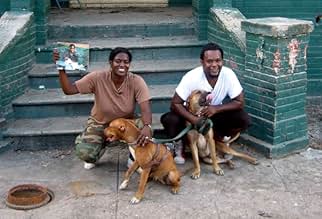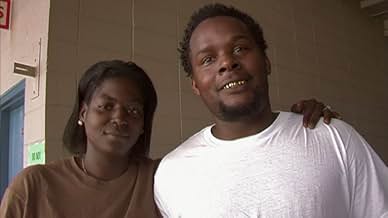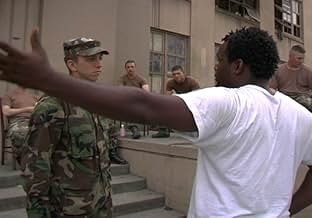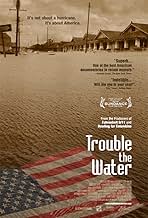Füge eine Handlung in deiner Sprache hinzuA redemptive tale of an aspiring rap artist surviving failed levees and her own troubled past and seizing a chance for a new beginning.A redemptive tale of an aspiring rap artist surviving failed levees and her own troubled past and seizing a chance for a new beginning.A redemptive tale of an aspiring rap artist surviving failed levees and her own troubled past and seizing a chance for a new beginning.
- Für 1 Oscar nominiert
- 7 Gewinne & 14 Nominierungen insgesamt
- Self
- (Archivfilmmaterial)
- Self
- (Archivfilmmaterial)
- Self - Reporter
- (Archivfilmmaterial)
- (as Julie Chen)
- Self
- (Archivtonaufnahmen)
- (Synchronisation)
- Self
- (Archivfilmmaterial)
- (Nicht genannt)
Empfohlene Bewertungen
There are several striking images in the film, including a recording of a 911 call in which an woman requesting help can't get out of her attic which is flooding. The 911 attendant has to inform her that there is no help at this time, and the victim replies, "So I'm going to die?" Silence on the other end of the line.
It seems like the majority of the film is snatched from the video camera of a survivor, as such the footage can be, well, not professional, but in the end it doesn't matter, perhaps even adding to the realism. It turns out that the couple filming is a set of intriguing characters with admirable qualities. They are from the ninth ward, a poor section of New Orleans hit hardest by the storm, yet for those of us without that much contact with society's underbelly or the semi-destitute, they will probably surprise you with their values, intelligence, resolve and resourcefulness.
The strength of the film for me was not in any attempts at blame or inciting anger at a lack of assistance and the seeming complacency of leadership, but in a reflection on the human struggle, manifested through an inspiring family, and in a basic reminder to examine, nourish, and befriend your own community.
Hurricane Katrina, like the September 11 attacks (whose tenth anniversary is in a few days), is something that should always be remembered, maybe more so. It showed how detached the government had become from its most vulnerable citizens. The collapse of the levees and subsequent flooding of the Lower Ninth Ward became an excuse to dismantle New Orleans's public school system and replace it with vouchers. The documentary is even more relevant now, after Louisiana got a second strike in the form of the Deepwater Horizon spill.
This is a magnificent use of home video built in to a rage against poverty and illiteracy and racism. You can blame the victims here all you want, but image after image, scene after scene the plight of being an African American in this country is shoved in their faces...and in ours.
The lives of this family in the Lower 9th Ward are vividly drawn by themselves. When they confront what is outside, i.e., the post-segregation South, we are startled at the condescension, scorn and devaluation of human lives...if your skin is the wrong color.
The people here have no apologies for their lives. They lay it out and I suspect many will resist what struggles they face. But scene after scene, you can't walk away from this film without a better understanding of racism in America.
The stubborn will ask "Why didn't they leave when they were supposed to?" And this film records "How were they supposed to?" and "Where were they going to go?" In the face of it all, those who survive manage here to triumph. While the footage of the disaster is why most people will buy the ticket to see this, it's the struggle to survive, not only Katrina, that will last in the viewer's mind.
Wusstest du schon
- Zitate
elderly woman: The water is steady rising in the attic ma'am and I'm gonna drown in the attic.
9/11 dispatcher: Can you break a hole in the attic?
elderly woman: I tried. I broke a chair for it. I cannot pry this wood off this attic ma'am.
9/11 dispatcher: The police are not coming out until the weather conditions get better.
elderly woman: [long pause] So I'm gonna die.
[long pause]
elderly woman: Hello?
9/11 dispatcher: Yes.
elderly woman: I can't get out.
- SoundtracksHurricane Waters
Performed by Citizen Cope
Top-Auswahl
- How long is Trouble the Water?Powered by Alexa
Details
Box Office
- Budget
- 900.000 $ (geschätzt)
- Bruttoertrag in den USA und Kanada
- 520.151 $
- Eröffnungswochenende in den USA und in Kanada
- 28.606 $
- 24. Aug. 2008
- Weltweiter Bruttoertrag
- 522.766 $
- Laufzeit1 Stunde 30 Minuten
- Farbe
- Sound-Mix
- Seitenverhältnis
- 1.85 : 1
Zu dieser Seite beitragen































